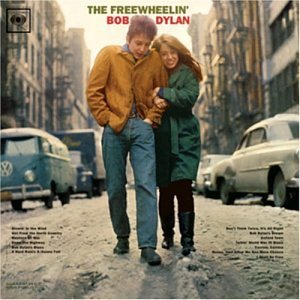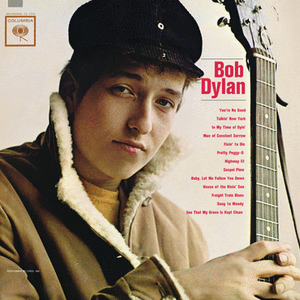
The Freewheelin' Bob Dylan is the second studio album by American singer-songwriter Bob Dylan, released on May 27, 1963 by Columbia Records. Whereas his self-titled debut album Bob Dylan had contained only two original songs, this album represented the beginning of Dylan's writing contemporary lyrics to traditional melodies. Eleven of the thirteen songs on the album are Dylan's original compositions. It opens with "Blowin' in the Wind", which became an anthem of the 1960s, and an international hit for folk trio Peter, Paul and Mary soon after the release of the album. The album featured several other songs which came to be regarded as among Dylan's best compositions and classics of the 1960s folk scene: "Girl from the North Country", "Masters of War", "A Hard Rain's a-Gonna Fall" and "Don't Think Twice, It's All Right".

Bob Dylan is the debut studio album by American singer-songwriter Bob Dylan, released on March 19, 1962 by Columbia Records. The album was produced by Columbia talent scout John H. Hammond, who had earlier signed Dylan to the label, a controversial decision at the time. The album primarily features folk standards but also includes two original compositions, "Talkin' New York" and "Song to Woody". The latter was an ode to Woody Guthrie, a significant influence in Dylan's early career.

The Times They Are a-Changin' is the third studio album by American singer-songwriter Bob Dylan. It was released on February 10, 1964 through Columbia Records. Whereas his previous albums, Bob Dylan and The Freewheelin' Bob Dylan, combined original material and cover songs, this was the first to feature only original compositions. The album consists mostly of stark, sparsely arranged ballads concerning issues such as racism, poverty, and social change. The title track is one of Dylan's most famous; many feel that it captures the spirit of social and political upheaval that characterized the 1960s.
"A Hard Rain's a-Gonna Fall" is a song written by American musician and Nobel Laureate Bob Dylan in the summer of 1962 and recorded later that year for his second studio album, The Freewheelin' Bob Dylan (1963). Its lyrical structure is based on the question-and-answer refrain pattern of the traditional British ballad "Lord Randall", published by Francis Child.

Live 1966: The "Royal Albert Hall" Concert is a two-disc live album by Bob Dylan, released in 1998. It is the second installment in the ongoing Bob Dylan Bootleg Series on Legacy Recordings, and has been certified a gold record by the RIAA. It was recorded at the Manchester Free Trade Hall during Dylan's 1966 world tour, though early bootlegs attributed the recording to the Royal Albert Hall so it became known as the Royal Albert Hall Concert. Extensively bootlegged for decades, it is an important document in the development of popular music during the 1960s.

The Bootleg Series Vol. 6: Bob Dylan Live 1964, Concert at Philharmonic Hall is a live album by Bob Dylan, released in 2004 on Legacy Records. It is the fourth installment of the ongoing Bob Dylan Bootleg Series. The album is the complete recording from the October 31, 1964 "Halloween" show at Philharmonic Hall in Manhattan by Bob Dylan.

Live at The Gaslight 1962 is a live album including ten songs from early Bob Dylan performances recorded in October 1962 at The Gaslight Cafe in New York City's Greenwich Village. Released in 2005 by Columbia Records, it was originally distributed through an exclusive 18-month deal with Starbucks, after which it was released to the general retail market. The album release coincided with the release of the documentary No Direction Home: Bob Dylan.
"Talkin' World War III Blues" is a song written and performed by the American singer-songwriter Bob Dylan that was first released as the tenth track of his 1963 album The Freewheelin' Bob Dylan. Like nearly every song on the album, it is performed by Dylan solo, accompanying himself on acoustic guitar and harmonica played in a rack.
"Masters of War" is a song by Bob Dylan, written over the winter of 1962–63 and released on the album The Freewheelin' Bob Dylan in the spring of 1963. The song's melody was adapted from the traditional "Nottamun Town." Dylan's lyrics are a protest against the Cold War nuclear arms build-up of the early 1960s.
"Tombstone Blues" is a song by American singer-songwriter Bob Dylan, which was released as the second track on his sixth studio album Highway 61 Revisited (1965). The song was written by Dylan, and produced by Bob Johnston. Critical interpretations of the song have suggested that the song references the Vietnam War and US President Lyndon Baines Johnson.

"Just Like Tom Thumb's Blues" is a song written and performed by Bob Dylan. It was originally recorded on August 2, 1965, and released on the album Highway 61 Revisited. The song was later released on the compilation album Bob Dylan's Greatest Hits Vol. II and as two separate live versions recorded at concerts in 1966: the first of which appeared on the B-side of Dylan's "I Want You" single, with the second being released on The Bootleg Series Vol. 4: Bob Dylan Live 1966, The "Royal Albert Hall" Concert. The song has been covered by many artists, including Gordon Lightfoot, Cat Power, Nina Simone, Barry McGuire, Judy Collins, Frankie Miller, Linda Ronstadt, the Grateful Dead, Neil Young, The Black Crowes, Townes Van Zandt, and Bryan Ferry. Lightfoot's version was recorded only weeks after Dylan's original had been released and reached #3 on the Canadian RPM singles chart.

"Stuck Inside of Mobile with the Memphis Blues Again" is a song by American singer-songwriter Bob Dylan from his seventh studio album, Blonde on Blonde (1966). The song was written by Dylan and produced by Bob Johnston. It has nine verses, each featuring a distinct set of characters and circumstances. All 20 takes of "Stuck Inside of Mobile with the Memphis Blues Again" were recorded in the early hours of February 17, 1966, at Columbia Records's A Studio in Nashville, Tennessee, with the last take selected for the album. This version also appears on Dylan's second compilation album, Bob Dylan's Greatest Hits Vol. II (1971).
"Who Killed Davey Moore?" is a topical song written in 1963 by American folk singer/songwriter Bob Dylan. Though the song was not commercially released on Dylan's several studio albums in the 1960s, it was popular in his repertoire for live shows during that era. Dylan's performance of the song at Carnegie Hall on October 26, 1963, would later be released on The Bootleg Series Volumes 1–3 1961–1991 in 1991, and an October 1964 performance is on The Bootleg Series Vol. 6: Bob Dylan Live 1964, Concert at Philharmonic Hall, released in 2004.
Bob Dylan bootleg recordings are unreleased performances by American singer-songwriter Bob Dylan, that have been circulated throughout the public without undergoing an official, sanctioned release. It is commonly misconceived that bootlegs are only restricted to audio, but bootleg video performances, such as Dylan's 1966 film Eat the Document, which remains officially unreleased, are considered to be bootlegs. Dylan is generally considered to be the most bootlegged artist in rock history, rivaled only by the Grateful Dead.
"Talkin' John Birch Paranoid Blues", also known as "Talkin' John Birch Society Blues" and "Talkin' John Birch Blues", is a protest song and talking blues song written by singer-songwriter Bob Dylan in 1962. It is a satirical song, in which a paranoid narrator is convinced that communists, or "Reds" as he calls them, are infiltrating the country. He joins the John Birch Society, an anti-communist group, and begins searching for Reds everywhere. The narrator decries Betsy Ross as a communist and four U.S. Presidents as Russian spies, while lauding Adolf Hitler and George Lincoln Rockwell. After exhausting the possibilities of new places to find communists, he begins to investigate himself.

The Bootleg Series Vol. 9: The Witmark Demos: 1962–1964 is a compilation album by American singer-songwriter Bob Dylan, containing demo recordings he made for his first two publishing companies, Leeds Music and M. Witmark & Sons, from 1962 to 1964. The seventh installment of the ongoing Bob Dylan Bootleg Series, it was released on October 19, 2010 on Legacy Records.
"Mama, You Been on My Mind" is a song by American singer-songwriter Bob Dylan. Written in 1964 during a trip to Europe, the song dealt with his recent breakup with his girlfriend, Suze Rotolo. Dylan first recorded the song in June of that year during a session for his album Another Side of Bob Dylan. However, the song was not included on the album, and Dylan's version remained unreleased until 1991. In total, in the 1990s and 2000s four versions were put out on Dylan's Bootleg Series of releases, including two live performances with Joan Baez from 1964 and 1975.
Bob Dylan is an American musician, singer-songwriter, music producer, artist, and writer. He has been an influential figure in popular music and culture for more than five decades. Much of his most celebrated work dates from the 1960s when he was an informal chronicler and a seemingly reluctant figurehead of social unrest.
"Talkin' Bear Mountain Picnic Massacre Blues" is a song by American singer-songwriter Bob Dylan. It was written by Dylan in June 1961, and recorded on April 25, 1962, at Studio A, Columbia Recording Studios, New York, produced by John Hammond. It is a humorous talking blues, which Dylan wrote after Noel Stookey gave him a press clipping about how the sale of forged tickets for a Father's Day picnic trip to Bear Mountain State Park had led to overcrowding and injuries.
"I Shall Be Free" is a song by American singer-songwriter Bob Dylan. It was recorded on 6 December 1962 at Studio A, Columbia Recording Studios, New York, produced by John Hammond. The song was released as the closing track on The Freewheelin' Bob Dylan on 27 May 1963, and has been viewed as a comedic counterpoint to the album's more serious material. Dylan has never performed the song in concert.









